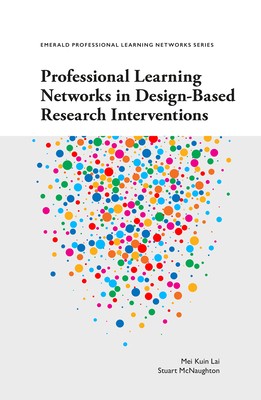
- We will send in 10–14 business days.
- Author: Mei Kuin Lai
- Publisher: Emerald Publishing Limited
- ISBN-10: 178769724X
- ISBN-13: 9781787697249
- Format: 12.5 x 19.3 x 1 cm, softcover
- Language: English
- SAVE -10% with code: EXTRA
Professional Learning Networks in Design-Based Research Interventions (e-book) (used book) | bookbook.eu
Reviews
Description
Professional learning networks (PLNs) have been promoted as one way of improving practice in research methodologies and frameworks aimed at the improvement of practice. However, such networks are not yet the norm and there is a growing need for books that provide a theoretical and practical account of how to develop and utilise networks effectively. Mei Kuin Lai and Stuart McNaughton address this need by providing a theoretical and practical account of how PLNs focused on collaborative analysis of data can be integrated into design-based research interventions to improve practice and student learning outcomes.
Drawing primarily on examples from a design-based research intervention, the Learning Schools Model, topics covered include theoretical approaches to understanding networks, network purposes and features, constraints and enablers and future directions in utilising networks within design-based research. This intervention is one of the few demonstrations of a consistent and replicable effect of analysing and discussing data in networks on student outcomes within a wider design-based intervention design. The authors discuss the constraints and enablers of the context that influence how PLNs might be implemented across different contexts. Examples of how PLNs can demonstrate fidelity to the general structure of effective networks while adapting to local variations are also provided, enabling readers to conceptualise and design similar networks appropriate to their context.
EXTRA 10 % discount with code: EXTRA
The promotion ends in 15d.07:53:41
The discount code is valid when purchasing from 10 €. Discounts do not stack.
- Author: Mei Kuin Lai
- Publisher: Emerald Publishing Limited
- ISBN-10: 178769724X
- ISBN-13: 9781787697249
- Format: 12.5 x 19.3 x 1 cm, softcover
- Language: English English
Professional learning networks (PLNs) have been promoted as one way of improving practice in research methodologies and frameworks aimed at the improvement of practice. However, such networks are not yet the norm and there is a growing need for books that provide a theoretical and practical account of how to develop and utilise networks effectively. Mei Kuin Lai and Stuart McNaughton address this need by providing a theoretical and practical account of how PLNs focused on collaborative analysis of data can be integrated into design-based research interventions to improve practice and student learning outcomes.
Drawing primarily on examples from a design-based research intervention, the Learning Schools Model, topics covered include theoretical approaches to understanding networks, network purposes and features, constraints and enablers and future directions in utilising networks within design-based research. This intervention is one of the few demonstrations of a consistent and replicable effect of analysing and discussing data in networks on student outcomes within a wider design-based intervention design. The authors discuss the constraints and enablers of the context that influence how PLNs might be implemented across different contexts. Examples of how PLNs can demonstrate fidelity to the general structure of effective networks while adapting to local variations are also provided, enabling readers to conceptualise and design similar networks appropriate to their context.


Reviews